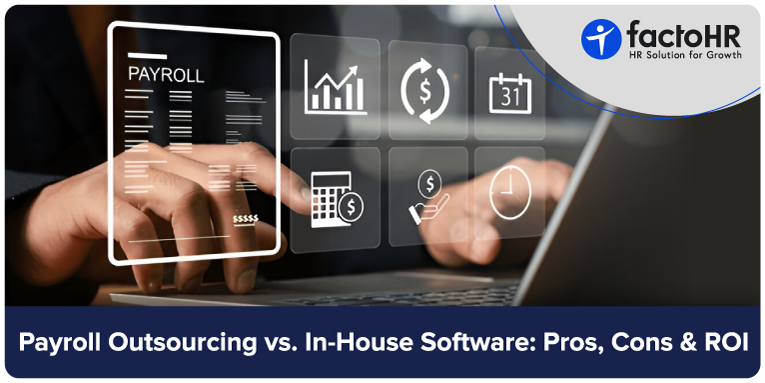In-House Payroll vs Outsourcing: Which is Best for You?

Table of Contents
A payroll system is crucial for any organization, whether you’re a business owner or manage a small to mid-sized enterprise. It plays a key role in ensuring accurate management of employee salaries, benefits, taxes, and compliance.
While the payroll process may seem simple, it’s a complex process involving data collection, processing, payment disbursement, and regulatory reporting, each requiring accuracy.
In-house payroll software can increase the burden on HR and accounting teams, diverting their focus from strategic activities. Payroll outsourcing offers a solution, but choosing between the two can be complex. Both options come with pros and cons, and the right choice depends on your organization’s size, available resources, and the level of control you need.
This guide explores In-House Payroll vs Outsourcing, evaluating their pros and cons, as well as their return on investment (ROI), to help organizations choose the best payroll solution for their specific requirements.

What is In-House Payroll Software?
An in-house payroll software involves the company’s internal team managing the complete payroll process. The HR or finance team processes payroll, starting with setting up bank accounts for salary disbursement and recording employees’ working hours using a tracking system. Based on these records, total pay is calculated, and taxes and benefits are deducted to get the final salary. Employees receive their remuneration on the scheduled payday.
The primary benefit of an in-house payroll system is complete control over the process, enabling customization of workflows according to business needs, implementing changes, and resolving issues promptly. However, using payroll software requires regular monitoring to avoid compliance issues and penalties, as well as spending time to handle the details.
Modern payroll software has made in-house payroll systems accessible to even small and medium-sized enterprises (SMEs). With features like automated calculations, tax deduction, and pay slip generation, HR managers can manage everything from their laptops (or even their phones). Additionally, it keeps sensitive employee data secure.
Pros & Cons of In-House Payroll Software
| Pros | Cons |
|---|---|
| Complete control over the payroll process | Time consuming |
| Data privacy and security | Higher software and training costs |
| Customization | Error and compliance risks |
| Immediate access and communication (to resolve payroll issues) | Scalability issues |

What is Payroll Outsourcing?
Payroll outsourcing means partnering with a professional payroll service provider to manage the payroll. This includes pay calculations, tax withholdings, form filings, and processing payments. Outsourcing payroll services ensures accuracy and compliance with tax laws and regulations, reducing the risk of errors and penalties. They manage all basic payroll functions, from tracking hours to issuing pay slips.
You can designate the payroll process, including compensation, tax management, and benefits administration, or outsource specific tasks while retaining control over others. This model suits enterprises requiring an experienced partner for complex payroll. Simply provide the essential information, and they will manage the payroll process.
Pros & Cons of Payroll Outsourcing
| Pros | Cons |
|---|---|
| Improves Time and Resource efficiency | Lack of control |
| Expert Compliance Management | Dependency |
| Reduces payroll error | Data security concerns |
| Scalable | Operational disruptions |
| Access to expertise and advanced technology | Cost |
In-House Payroll vs Outsourcing: Which Payroll Process is Right for You?
Finding the right payroll outsourcing vs in-house can be challenging. Selecting a payroll process that is unsuitable for you can lead to a loss. As it is a complex matter, you should focus on your company’s and HR needs. To ease your decision-making process, here are a few factors you could consider to select the best payroll solution for your business.
| Factors | In-House Payroll Software | Payroll Outsourcing |
|---|---|---|
| Control and Management | Complete control over the payroll process | A payroll service provider manages the process |
| Time and Resources | Invest in payroll software and training | No company resources are used. Just pay the fees |
| Compliance | The company is responsible for complying with tax and labour law regulations | The service provider ensures compliance, reducing the risk of error and penalties |
| Scalability | Requires technological investments as the company grows | Flexible with the company’s growth |
Ultimately, the decision between in-house payroll and outsourcing depends on your company’s specific requirements. Outsourcing may be a better option for companies that are growing and those that lack a dedicated HR team. Whereas, keeping in-house payroll software can be a cost-saving option for those with a dedicated HR team.

ROI Analysis: Payroll Outsourcing vs. In-House Software
Return on Investment (ROI) is a key performance indicator used to evaluate the efficiency and profitability of an investment. In-house payroll software automates tasks, providing cost and time savings, compliance benefits, improved efficiency, and accurate payouts, suitable for all business types. On the other hand, outsourcing payroll can provide a better return on investment (ROI) for small businesses because it simplifies compliance and reduces the need for internal resources.

Cost Comparison
Maintaining in-house payroll software can be more cost-effective over time, especially when using customizable software like factoHR, which is suitable for various businesses. After the initial setup, monthly expenses are typically low, based on the number of employees or features you choose to use.
On the contrary, payroll outsourcing may save you time, but it may charge higher service fees. You are paying for convenience, expertise, and ongoing support services, and outsourcing can be cost-effective for growing businesses or those without dedicated HR resources.
Time Savings
In-house payroll software simplifies and automates the payroll process, while outsourcing allows HR teams to focus on other important administrative tasks. However, they won’t have control over their payroll process.
Error Reduction and Compliance
In-house and payroll outsourcing can effectively manage compliance, but only if done correctly. Payroll software must be updated to reflect revised labor laws. In payroll outsourcing, experienced professionals handle compliance. However, you must trust your provider’s diligence and accuracy regarding data security. Regardless, the risk of fines and penalties for non-compliance is real; therefore, whichever option you choose, ensure it complies with the laws.
Scalability and Flexibility
As the company grows, an in-house payroll solution requires significant technological investment, whereas an outsourced payroll solution remains scalable to the business’s growth.
Calculating ROI
The Return on Investment (ROI) refers to measuring the profit or loss generated from an investment. Calculating the ROI of in-house payroll software involves evaluating various quantifiable factors, which are measured numerically or expressed as data.
On the contrary, outsourcing offers benefits, such as freeing up internal resources and lower costs, which can transform business operations and development plans. Without ROI evaluation, it’s challenging to assess if the outsourcing initiative delivers the expected results.
Why is factoHR Payroll Software the Best for Your Business?
The payroll process is prone to errors, compliance issues, and paperwork can be time-consuming. Handling the complex in-house payroll process or outsourcing payroll without transparency may cause significant concerns.
You’ve explored the advantages and drawbacks of both, empowering you to make an informed decision that aligns with your business’s requirements, even if you are the owner of a small business.
If you’re considering software for optimizing and processing your payroll, consider contacting factoHR for a consultation. Their personalized solutions and expert on-call support can help you navigate your business requirements, ensuring your payroll operations are both efficient and fully compliant with regulations. You’ll be in great hands!
factoHR’s payroll software easily integrates with existing systems, provides security, offers scalability, support, and processes payroll with just a single click.

Conclusion
When choosing between in-house vs payroll outsourcing, it’s essential to consider the pros and cons of both options. Payroll is the most important function that impacts employee satisfaction, compliance, and overall business operations. In-house payroll software gives you more control, customization, data privacy, and security. On the contrary, outsourcing payroll improves efficiency in terms of time and resources, manages compliance more effectively, and enhances scalability.
Selecting an in-house payroll software or partnering with a reliable service provider (if outsourcing) depends on several factors, such as the company’s size, budget, and priorities. No matter which option you opt for, investing in the right payroll strategy will ultimately save your business time, money, and effort.
Grow your business with factoHR today
Focus on the significant decision-making tasks, transfer all your common repetitive HR tasks to factoHR and see the things falling into their place.

© 2026 Copyright factoHR


